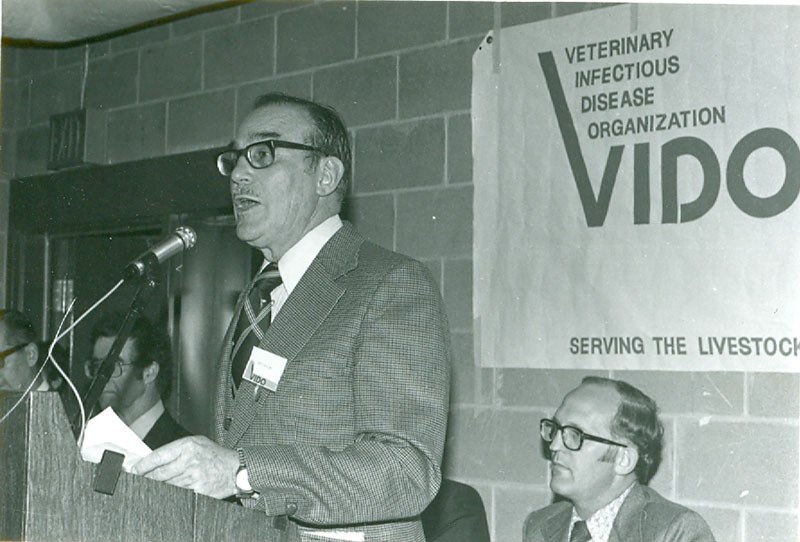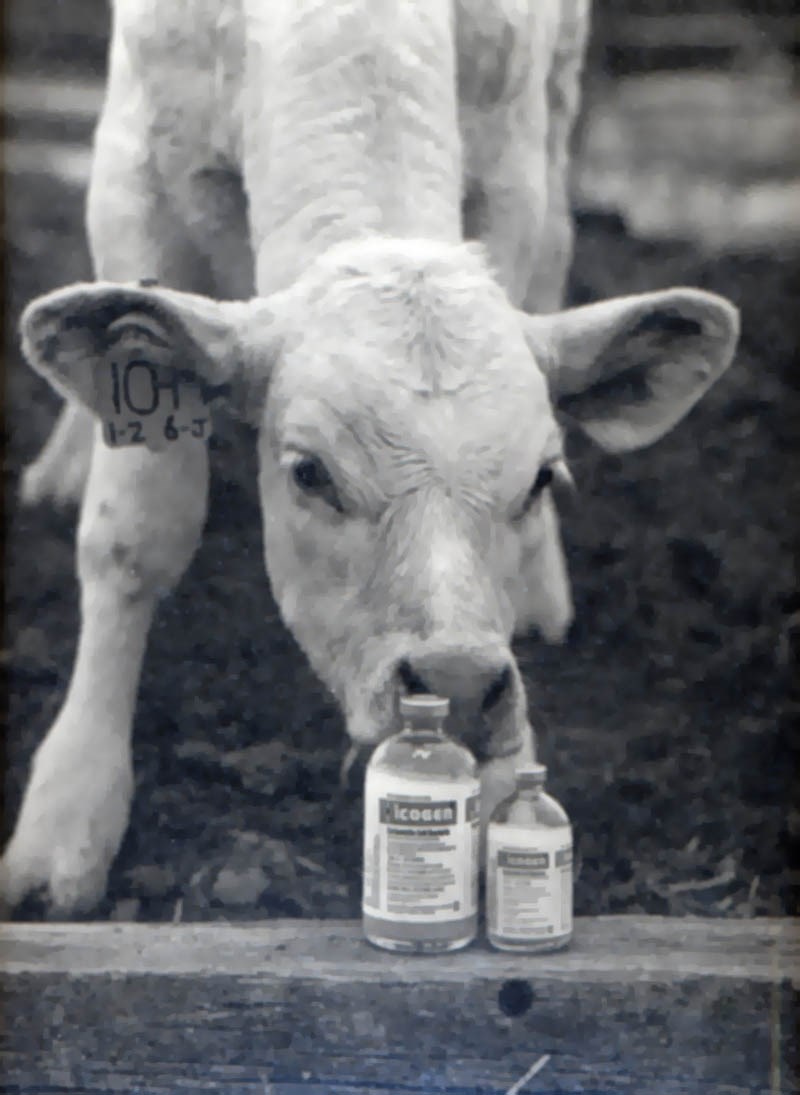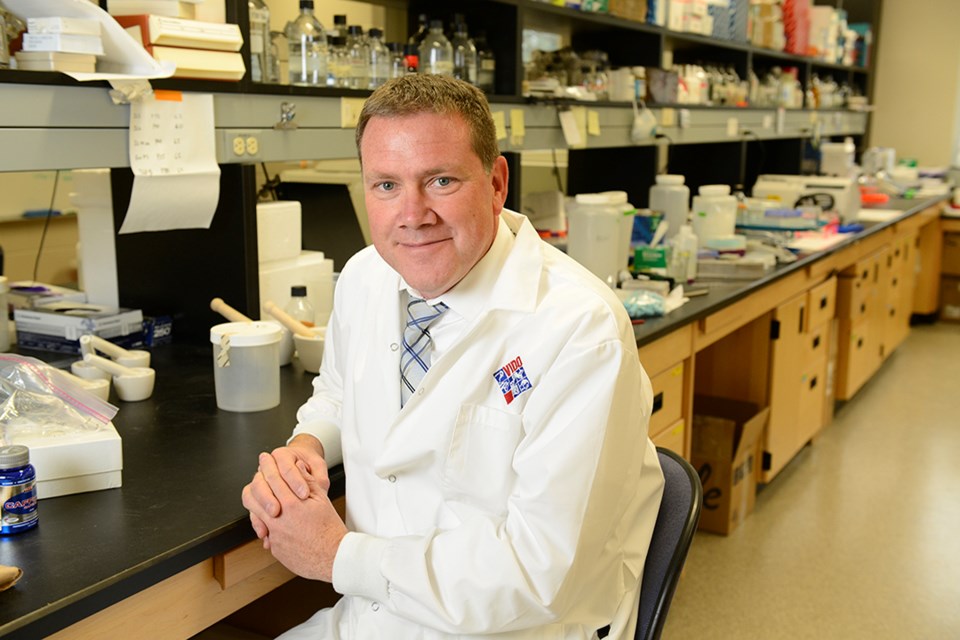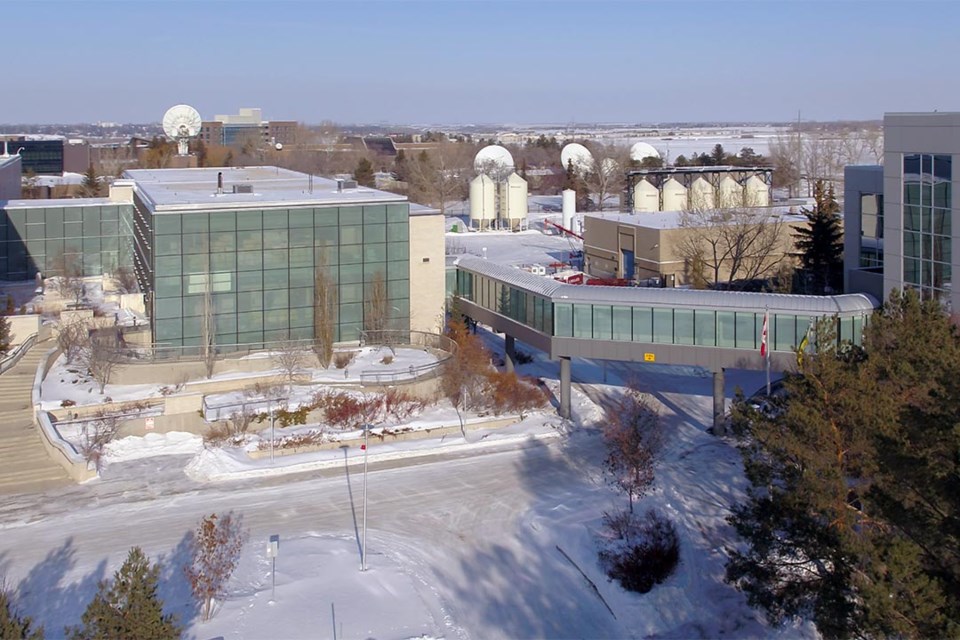SASKATOON — As VIDO celebrates half a century of operations on the University of Saskatchewan (USask) campus, it reflects on its rich history, remarkable achievements, and the legacy of innovation that continues to shape the future of infectious disease research. VIDO has grown from a small, veterinary research-focused laboratory into one of the world’s leading centres for human and animal infectious disease research and vaccine development. Behind its groundbreaking research and development are the people whose drive, determination, and expertise fuel its mission to create a healthier world.
Humble beginnings

VIDO founder Dr. Christopher Bigland (DVM) with the first VIDO logo in the 1970s when it was first known as the Veterinary Infectious Disease Organization. | Photo courtesy VIDO
VIDO’s journey began in the mid-1970s, at a time when global attention to infectious diseases was growing. The organization, originally called the Veterinary Infectious Disease Organization, was spun off from the Western College of Veterinary Medicine (WCVM) to address the need for innovative solutions to emerging livestock diseases. At the time, Saskatchewan was primarily known for its agricultural economy and VIDO’s founders recognized the organization’s potential to contribute to solving challenges faced by the province’s (and Canada’s) livestock industry.
Dr. Christopher Bigland (DVM), VIDO’s founding director (1975-1983), was quoted as saying “excellent support came from the livestock industry and was not only beneficial when talking to government and foundation personnel but was also a tremendous stimulus to the research effort.”
“The vision behind VIDO was simple but ambitious: to harness the power of scientific discovery to tackle infectious diseases and improve the lives of animals and people around the world,” said Dr. Lorne Babiuk (PhD), VIDO director from 1993-2007. “While our beginnings were modest, embracing a team culture, and the dedication and ingenuity of our researchers have always been the driving force behind our success.”
In the early years, the organization focused on developing vaccines for livestock diseases, producing eight commercial veterinary vaccines, with six described as world firsts. These technologies laid the foundation for future breakthroughs. Over the decades, VIDO’s scope expanded significantly, leveraging cutting-edge technologies to develop vaccines for humans and embracing this new focus by rebranding as the Vaccine and Infectious Disease Organization in 2003.
From veterinary research to global health
VIDO’s research has made a meaningful impact on livestock producers and agriculture. VIDO’s first commercial vaccine, VICOGen, produced in 1978 was the first vaccine for calf scours, and significantly reduced calf mortality and financial losses for cattle producers, ultimately improving our nation’s food security. This early success highlighted the organization’s ability to address urgent challenges while laying the groundwork for broader contributions to public health.

In 1978, VIDO launched its first vaccine, VICOGENTM, an E.coli scours vaccine for cattle, in collaboration with Connaught Laboratories. | Photo courtesy VIDO
In the 2000s, VIDO expanded its research mandate to include zoonotic diseases – those transmitted between animals and humans. This early transition proved vital as the world began recognizing the interconnectedness of animal and human health, a paradigm called “One Health.”
Many of the emerging infectious diseases were Containment Level 3 (CL3) or higher and as a result VIDO leadership recognized that its scientists would require new containment facilities to continue to play a significant international role. In 2011, VIDO completed construction of one of the largest, most advanced, CL3 facilities in the world – the International Vaccine Centre. This expansion addressed VIDO’s ability to research the ever-growing list of emerging infectious diseases requiring enhanced containment.
During the COVID-19 pandemic, VIDO scientists became the first in Canada to isolate SARS-CoV-2, enabling the development of critical in vitro systems and animal models for testing vaccines and treatments using the CL3 facility. VIDO evaluated over 500 potential solutions for organizations worldwide and advanced its own vaccine candidate, contributing to the global fight against COVID-19. In addition, VIDO scientists shared real-time data with global experts in a co-ordinated effort led by the World Health Organization to end the pandemic.
“This was a defining moment for VIDO, showcasing its agility and commitment to addressing urgent health challenges,” said Dr. Volker Gerdts (DVM, PhD), VIDO’s director and CEO. “The commitment of our team and their impact during COVID-19 exemplifies the critical role we play in safeguarding global health.”
The people behind the science
VIDO’s success stems from the dedication of its people—a diverse team of scientists, students and staff from more than 35 countries. Their ingenuity has driven advancements in vaccine development and infectious disease research, creating solutions that improve lives worldwide.
“Our strength lies in our people,” said Gerdts. “Their creativity and resilience turn challenges into opportunities for global health improvement.”

Dr. Volker Gerdts (DVM, PhD) began his appointment as VIDO’s fifth director and CEO on January 1, 2019. | Photo courtesy VIDO
VIDO also plays an essential role in training the next generation of scientists. VIDO’s alumni continue to shape science, industry, and policy worldwide, ensuring that the organization’s legacy extends far beyond its walls.
Canada’s Centre for Pandemic Research
To establish itself as a critical hub for pandemic preparedness and response, VIDO recognized that its scientists must have the ability to study all pathogens and rapidly develop vaccines and therapeutics to combat emerging infectious diseases, including those with pandemic potential. Some key initiatives that have occurred since the COVID-19 pandemic to promote the organization as Canada’s Centre for Pandemic Research include:
- establishing an in-house CL3 capable vaccine manufacturing facility (complete);
- currently developing Containment Level 4 capacity, to be completed in near future (ongoing);
- building a new animal housing facility with the flexibility to house a variety of key species and vectors (such as ticks), to be completed in near future (ongoing), and;
- attracting new talent to expand our expertise and train the next generation of scientists.
Developing resources at VIDO is about more than infrastructure – it represents a commitment to ensuring the world is better equipped to handle emerging health crises.
“VIDO’s role as Canada’s Centre for Pandemic Research is vital to USask, Canada and the world,” said Dr. Baljit Singh (MVSc, PhD), vice-president of research at USask and member of VIDO’s Board of Directors. “In this capacity, VIDO not only serves as a research and training leader in infectious diseases but also as a critical part of Canada’s national health infrastructure, working to ensure we can be what the world needs in response to health threats that may arise in the future.”
A legacy of partnerships
From its earliest days, VIDO has recognized that global health challenges require collective solutions. By prioritizing collaborations with livestock producers, global high containment research organizations, networks foundations/funders and industry partners, VIDO has contributed significantly to understanding infectious disease and global vaccine development.
“Collaboration drives innovation,” said Dr. Andrew Potter (PhD), VIDO director from 2007-2019. “Our work with diverse partners has been key to translating research into real-world solutions.”
Looking to the future
As VIDO celebrates its 50th anniversary, it looks ahead with a renewed sense of purpose. With an eye on emerging infectious diseases that threaten the world, VIDO continues to grow its impact by strengthening its research capacity and global partnerships. The organization is also committed to ensuring the next generation of scientists and researchers are ready to continue the battle, ensuring that its legacy of innovation continues for decades to come.
“We are committed to developing solutions that will improve human and animal health worldwide,” said Gerdts. “As we look ahead, we are focused on the next frontier of research—whether it’s developing new vaccines, addressing antibiotic resistance, or tackling other emerging infectious diseases.”




